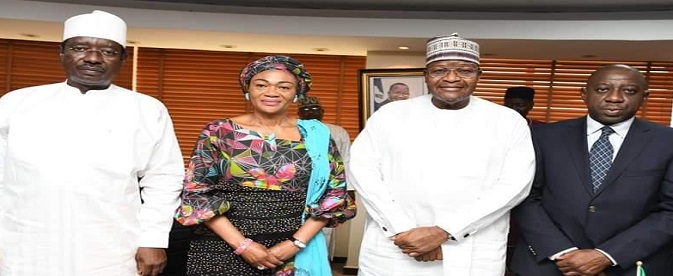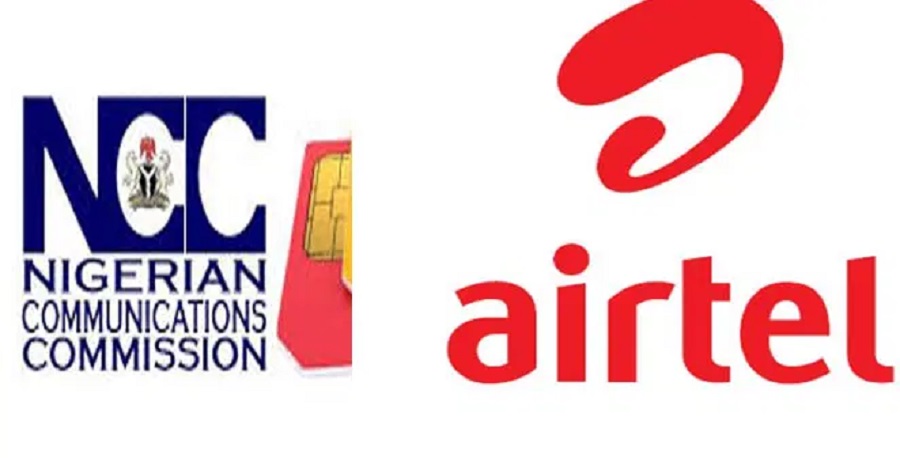Telecom
Senate Committee Commends NCC’s Regulatory Performance

Senate Committee on Communications said it was impressed by the various regulatory interventions which the Nigerian Communications Commission (NCC) has taken to ensure improved service delivery and bridging access gaps in the country.

L-R: Sen. Ibrahim Bomai, Vice Chairman, Senate Committee on Communications; Sen. Oluremi Tinubu, Chairman, Committee; Prof. Umar Danbatta, Executive Vice Chairman, Nigerian Communications Commission (NCC) and Mr. Adeleke Adewolu, Executive Commissioner, Stakeholder Management, NCC, during the familiarization and fact-finding tour of the Committee to the Commission in Abuja .
Senator Oluremi Tinubu, chairman of the Committee, who led other members of the Committee to NCC’s Head Office in Abuja on a familiarisation and fact-finding visit, said, given the mammoth of challenges facing the industry and the achievements of the Commission so far, its regulatory interventions and performance deserves to be appreciated and commended.
The Committee members were received by the Executive Management team of the Commission, led by Prof. Umar Danbatta, NCC’s executive vice chairman (EVC), who provided a detailed briefing of the Commission’s core mandates, its various initiatives that have helped to improve wider access to telecommunications as well as the challenges in the regulatory environment, which formed the basis for the comments made by the Committee members.
“We are here on a familiarisation and fact-finding tour to the Commission but I must say that we are impressed by the presentation made by the Executive Vice Chairman of NCC, Prof. Umar Danbatta, on the activities of the Commission so far in regulating the industry.
“We particularly see the Platinum Category Certificate of Award for exceptional organisational performance which NCC received from the Bureau of Public Service Reforms (BPSR) in 2017 as a testament to your recognition as a performing agency of the Federal Government. However, we want you to do more for Nigerians, ” Tinubu said.
Earlier, while addressing the Committee members, Danbatta reeled out industry statistics which, irrefutably captured the growth recorded in the industry.
According to him, Nigeria attained and surpassed 30 percent broadband penetration target in December, 2018 and the penetration has further increase to 38.49 per cent as of December, 2019.
Also, Danbatta said the number of active phone lines has increased to over 185 million; active Internet subscriptions on global system for mobile communications (GSM), fixed wired and voice over internet protocol (VoIP) networks have equally increased to over 126 million.
The EVC added that teledensity is 96.76 per cent, and quarterly contribution of telecoms to gross domestic product (GDP) has reached 10.60 per cent. The NCC, through the Universal Service Provision Fund (USPF) has reduced the number of access-gaps clusters in the country further from 114. Hitherto, some 38 million Nigerians were affected by access gap clusters.
Danbatta explained to the Committee what the Commission has done, so far, with respect to spectrum administration in the sector.
He stated that despite the crucial role of spectrum, and being a scarce resoure, the Commission has deployed spectrum quite effectively for the development of the telecom industry.
Some of the clear goal-oriented programmes in that regard include development of spectrum trading, ongoing effort to leverage Television White Space (TVWS) to address rural connectivity, the Proof of Concept (PoC) non-commercial trial of Fifth Generation (5G) networks, and development guidelines on commercial satellites deployment.
Danbatta stated that the Commission’s efforts in licensing Infrastructure Companies (InfraCos) to cascade fibre optic into the hinterland to reach all the 774 Local Government Areas (LGAs) in the country, is succeeding and will bolster government’s effort at expanding the nation’s broadband infrastructure.
The EVC recalled various inter-agency collaborations, frequent engagement of state governments to discuss issue of Right of Way (RoW), multiple regulations, taxation and other challenges, are consciously articulated towards improving deployment of telecoms infrastructure to ensure improved services for the telecom consumers.
The Commission, Danbatta said, has also issued various Directions to Mobile Metwork Operators (MNOs) with respect to roll-over data and forceful subscriptions to ensure that consumers are not shortchanged by market forces.
Similarly, Danbatta said the introduction of Do-Not-Disturb (DND) 2442 Short Code to manage unsolicited messages, the Toll-Free Number (622) for the escalation of complaints and the 112 Emergency Communication Number which is connected to the Emergency Communication Centres (ECCs), are conscious policies put in place to ensure that the rights of telecom consumers are safeguarded and to ensure that Nigerians enjoy derivable benefits of new communication technologies.
At the moment, eighteen (18) states of the Federation currently have operational ECCs while the efforts are ongoing by the Commission to ensure ECCs are operational in the remaining states in the country.
The EVC also told the Committee members that the Commission is instrumental to the listing of MTN and Airtel on the Nigeria Stock Exchange (NSE); resolved N1.03 trillion fine against MTN; promoted the Code of Corporate Governance in the industry from voluntary to mandatory compliance; developed new numbering plan to enhance opportunities for emerging technologies; and restructured the telecoms value-added services (VAS) segment resulting in licensing of 10 VAS aggregator companies,
Danbatta, who appreciated the support of the National Assembly so far, however, listed key issues affecting the regulatory environment. These, he said, include power, which is the biggest challenge facing telecommunications operations in the country; multiple regulations and multiple regulations; security challenges, vandalism and theft of telecom installations and transmission cable cuts; as well as RoW issue.
The Committee members assured NCC of their readiness to support the regulatory efforts of the Commission through legislative intervention and other collaboration towards addressing the challenges in the regulatory environment.
They also urged the NCC to focus more on increased access across the country as well as ensuring affordability of telecoms services for Nigerians.
Telecom
Airtel Recommits to Fraud Prevention after NCC’s N104m Fine for SIM Registration Breaches

Airtel Nigeria has restated its commitment to transparency, customer safety, and regulatory collaboration following recent regulatory enforcement by the Nigerian Communications Commission (NCC).

The NCC had served Airtel Nigeria a notice of sanction over some alleged SIM infractions in Kano State and consequently slammed a fine of N104 million on the telecommunications firm.
NCC had in a letter, addressed to Airtel Nigeria Chief Executive Officer, dated May 26, 2025, signed by Chizua Whyte, head, Legal and Regulatory Services, and Mohammed Dari, acting head, Compliance Monitoring and Enforcement, on behalf of Dr Aminu Maida, executive vice chairman, NCC, titled: ‘Notice of Sanction: Non-Compliance with SIM Registration Directive in Kano,’ where the infractions were spelt out.
According to NCC, Airtel infractions include unauthorised SIM registrations using 198 unapproved devices, resulting in 8,275 registrations outside the 281 verified Airtel shops; premature activation of 63 MSISDNs prior to proper SIM registration, contrary to the provisions of the Registration of Communications Subscribers Regulations 2022; failure to conduct effective eyeballing, leading to 407 fraudulent SIM registrations with multiple NINs, contrary to the provision of the Registration of Communications Subscribers Regulations 2022 and failure to provide satisfactory explanation for SIM registrations conducted between 12.00 a.m and 6.00 a.m.
On the matter, the letter revealed that there were some letter exchanges and subsequent meetings on the infractions between the telecom regulator and Airtel, starting from January 12, 2025, March 19, 2025, March 24, 2025, and March 27, 2025, respectively.
Apparently, after investigations and responses from Airtel, the NCC was not satisfied and this led to the fine of N104 million, which was to be paid within seven days from the date the letter was issued.
Specifically, NCC fined Airtel N5 million, N12 million, N81.4 million and N5 million for the infractions respectively.
Reacting, Airtel, expressed appreciation to the NCC for uncovering the infractions, describing the development as a critical opportunity to strengthen internal processes and further align with national security and regulatory expectations
“We thank the NCC for its vigilance and continued support in protecting the integrity of the telecoms ecosystem. Airtel takes these findings seriously and is already implementing corrective measures,” a spokesperson for the company said.
Only recently, Airtel Nigeria’s CEO recently announced that the company is doubling its investment in the country, focusing on network expansion, fiber-to-the-street rollout, 4G/5G deployment, customer care upgrades, and digital infrastructure security.
These investments reinforce Airtel’s long-term vision of building a resilient and forward-looking telecom network that meets the evolving needs of Nigerians.
“Our systems are constantly evolving to stay ahead of scammers and malicious actors,” the spokesperson added. “This is not just about compliance; it’s about our responsibility to the millions of Nigerians who rely on Airtel daily.”
Airtel Nigeria says it will continue to work closely with the NCC and other arms of government to ensure high standards of service and safety for all telecom users nationwide.
Telecom
Kenya Beats Nigeria As the Most Progressive ICT Regulation in Africa

Kenya is celebrating its regulatory ecosystem being ranked as the most progressive in Africa. The International Telecommunications Union (ITU) has ranked the East African country first in its most recent ICT Regulatory Tracker.

ITU’s ICT Regulatory Tracker is an evidence-gathering tool for decision-makers and regulators. It demonstrates the effectiveness of regulatory systems in the age of technology.
The ITU evaluates the design of the national regulatory authority, the scope of the regulatory mandate, the obtaining regulatory environment, and the robustness of the competition framework in member countries.
Kenya received 93 points, up from 92 in 2023, and now leads the continent in best practices for ICT regulations.
Nigeria and South Africa finished second and third, with 92 and 88 points respectively. Malawi, Egypt, Rwanda, Morocco, Uganda, Burkina Faso, and Senegal complete the top 10 list.
Globally, Kenya was ranked 20th out of 194 countries covered.Italy led the rankings, with 100 points.
The regulator, Communications Authority (CA) of Kenya, said the achievement underscored Kenya’s commitment to creating a robust, technology-neutral regulatory environment that supports innovation, affordability and access.
Steve Isaboke, permanent secretary for broadcasting and telecommunications, visited CA Centre in Nairobi following the announcement on Thursday.
“The ranking is a clear testament of the excellent work that CA has done in spearheading Kenya’s digital transformation and driving digital access for all,” he said.
“After 25 years, CA’s regulatory regime has attained maturity, and gained global recognition. This ranking shows that the CA staff and leadership are executing their work diligently.”
Telecom
MTN’s Female Leadership Surges to 41.4%, Doubles Industry Average

MTN Nigeria Communications PLC has announced a significant increase in female representation within its leadership, with women now making up 41.4% of its workforce, a notable rise from 38.7% in 2023.

This figure reportedly doubles the industry average, positioning MTN Nigeria as a frontrunner in gender diversity within Nigeria’s ICT sector.
The company’s recently released 2024 Annual Report highlights its sustained commitment to workplace inclusion and gender equality, aligning with its “Ambition 2025” strategy. Female representation within the executive management team has reached approximately 46.7%.
MTN Nigeria attributes this progress to dedicated initiatives aimed at empowering women professionally. These include the “Women in Tech” programme, which provides targeted upskilling in high-demand fields such as Cloud Computing, Software Engineering, AI/ML, Data Science, and Cyber Security.
The “MTN Y’ello Mums Internship Programme” also supports young mothers in their transition back into the corporate world after career breaks.
Odunayo Sanya, executive director of the MTN Foundation, was recognised as the CSI Personality of the Year at the Nigeria Tech Innovation & Telecoms Awards (NTITA), further underscoring the company’s impactful social initiatives.
Additionally, Uto Ukpanah, the company secretary, received the inaugural Global Corporate Secretary of the Year Award from the Corporate Secretaries International Association (CSIA).
Speaking at a recent conference, Odunayo Sanya, emphasised the importance of balancing profitability and sustainability equation, saying, “Businesses today need to be purpose-driven. While the soul of business is profitability, it is not profitability alone that should matter to stakeholders.”
Uto Ukpanah, added, “Showcasing our corporate values and ethos to the world opens the door for greater collaboration with other organisations, as we believe there’s a lot to learn when we all come together. Governance continues to evolve. The challenges today are not the same as they were 10 years ago. Greater accountability is expected, and companies can only continue to do better.”
The company’s broader efforts in diversity and inclusion have been acknowledged with multiple accolades, including the Corporate Responsibility Award. MTN Nigeria also received the “Employer of the Year” award at the 4th Edition of the Nigeria Employers’ Consultative Association (NECA) Employers’ Excellence Awards.
Karl Toriola, CEO of MTN Nigeria, in the report, reiterated the company’s commitment to building a purpose-driven organisation, emphasising that its success is intrinsically linked to its people and their dedication to a shared vision.
“Since we initiated our culture transformation journey in 2021, our culture transformation has significantly enhanced employee engagement and organisational cohesion. It’s directly strengthened our ability to deliver outstanding business performance and drive sustainable long-term value for all our stakeholders.”

 Telecom3 days ago
Telecom3 days agoTelcos Threaten to Disconnect Banks over Misinformation on New USSD Charges

 Telecom3 days ago
Telecom3 days agoMTN Nigeria Plans N900Bn in Service Upgrade

 General News3 days ago
General News3 days agoJumia Marks 13 Years of E-Commerce Innovation and Impact in Nigeria

 Telecom3 days ago
Telecom3 days agoTelecom Regulators in Africa Chart New Course for a Data-driven Future

 Broadcasting3 days ago
Broadcasting3 days agoNetflix Hikes Subscription Fees Again in Nigeria over “Market Conditions”

 News3 days ago
News3 days agoAbbas Jega, Ex-AMCON ED, Testifies, Says Arik Never Cooperated With AMCON

 Broadcasting3 days ago
Broadcasting3 days agoNBC, Nigcomsat Launch Satellite Plan to Transform Broadcasting

 E-Financial3 days ago
E-Financial3 days agoNDIC Calls for Inputs to IADI Core Principles for Effective Deposit Insurance























